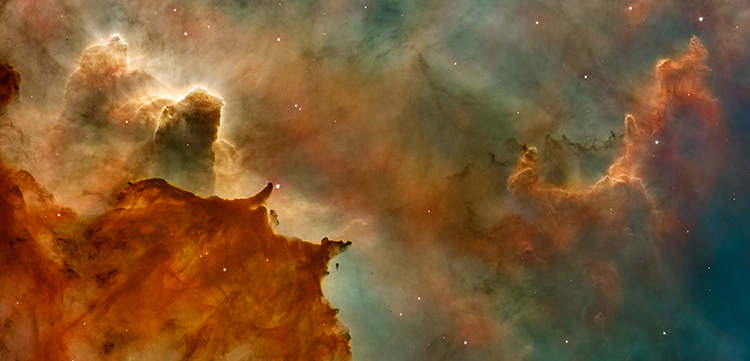Natural and Unnatural Selection
By Dr. Keith Witt
/
January 26, 2017

For three and a half billion years on earth, the development of all living creatures, plant or animal, happened more or less randomly in response to environmental changes and mutation of genes. This was a natural process, as in natural selection.
Enter our ancient ancestors. Everything changed about 200,000 years ago when their brains began having the capacities for modern language. People could more easily conceive of metaphors like “mother nature,” and routinely used words like “you,” “we,” and “I.” At this point in our evolutionary history humanity woke up to capacities for modern consciousness. When that happened, the balance of power shifted from nature’s natural selection to humans making unnatural selections. Humans began to deliberately alter themselves, families, artifacts, cultures, and ecosystems—seeking novelty, discovery, advantage, power, wealth, and service.
I thought about this the other day while I was sitting at my desk and watching a spider crawl up the wall. That triggered a memory of something that had happened about fifteen years ago, when I began noticing black widow spider webs appearing around our property. At first, I didn’t think much of it. Our house is built on a hill with lots of wooden corners and stairways giving black widows their favorite environment of dark nooks and crannies. As the webs multiplied over a period of several months, I continued to tell myself that I really didn’t have anything to worry about because I hadn’t yet seen any black widows.
On the other hand, I vaguely knew these spiders are nocturnal, and the webs were starting to concern me. Black widow webs are particularly suspicious, sinister, and chaotic, made from threads of incredible tensile strength (their web fiber is stronger than same size threads of steel—a characteristic I admire in black widows).
One night I couldn’t stand it any longer. I took a flashlight around the grounds and was horrified to see far too many enormous black widows hanging upside down in their webs. Their signature ruby hourglasses on their sinister ebony abdomens is one of those classic scary images. Worried about the safety of my kids and my clients, I decided these spiders needed a predator—me—to systematically destroy them.
Being an organic type of guy, I didn’t use chemicals, just old brooms and a flashlight. Every two or three nights, I’d force myself to walk out into the darkness, search for the webs, and crush the spiders within.
Now, I knew of course that black widows have no interest in hurting me—their venomous existence is impersonal and instinctual. Yet, even though these spiders had no particular malice toward me (until I started to slam them with an old broom), I sure had malice towards them.
Very soon, the spiders were mostly gone. Thanks to my use of unnatural selection, I dispatched them off the Witt family planet. I had the self-aware power to change the ecological balance of our yard.
But there were unexpected consequences to this slaughter. At first, my primary motivation to get rid of the spiders was fear they’d inadvertently harm someone, especially my family. I didn’t want them to suffer unnecessarily, but I realized, to my shock, that once I got swinging, I actually enjoyed crushing them. They scared me, I killed them, and when doing so, some primitive part of my brain was saying, “Go for it!” And the more I continued my unnatural selection, the more I found myself becoming more businesslike and dispassionate—less personal and more professional. This strangely made me a lot less scared of black widows.
On a far larger scale than my yard, human activity—unnatural selection—is causing the extinction of hundreds of species on this planet every month. Usually, this is not due to fear or animosity, but because our resources and available habitats are dwindling, and humans can be rapacious, selfish consumers who objectify others. Had I been able to see those black widow spiders less as objects and more as fellow travelers with their own ecological mission on earth, I might not have been able to kill them with such enthusiasm.
Should I have done what I did? Absolutely, in my opinion. I doubt I would have had such a visceral reaction had the spiders not felt quite so dangerous. I know all creatures are connected to everything in one way or another, but there is a food chain, and I am at the top of it (in my yard anyway).
In retrospect, I’m struck by all the relationships represented in this story—mine with black widows, theirs with my yard, me with my family, and the evolutionary dynamics of the world. Arguably, everything is relationships—with ourselves, others, the world, and spirit. Our “self” surfs the relationship waves of past, present, and future, reacting, deciding, and changing—hopefully reaching for universal harmony. Understanding that harmony and surfing with regard to everything serves the highest good—such intent makes it easier to make heartfelt and caring decisions. The more we evolve personally, the more we can understand how important it is to maintain a harmonious existence with all beings.
Perhaps if I were more evolved, I would allow black widows their own spot in my yard, out of the way of children and pets, where they could live their little lives without harm.
On the other hand, maybe not.
What do you think?
Image Credit: NASA on Unsplash
Image Credit: NASA on Unsplash
Get my FREE Art and Science of Relationships Series
I’m a licensed clinical psychologist, lecturer and author dedicated to studying, teaching, and creating transformative healing systems. I’ve been practicing psychotherapy for 40 years.
I want to give you access to the really GOOD stuff.
And I want to give it to you free of charge.